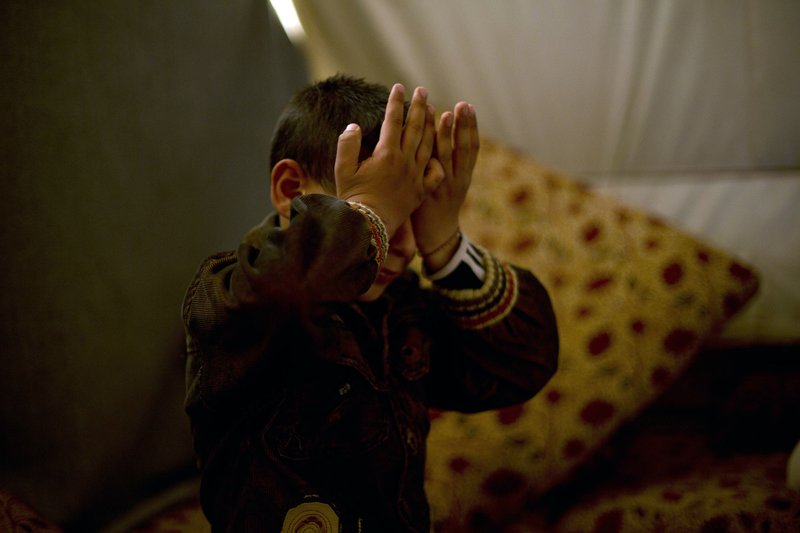They made the captive children, malnourished and weak from hunger, fight over a single tomato. Then the Islamic State group militants told them, “In paradise, you’ll be able to eat whatever you want. But first you have to get to paradise, and you do that by blowing yourself up.”
The lesson was part of the indoctrination inflicted by the militants on boys from Iraq’s Yazidi religious minority after the extremist group overran the community’s towns and villages in northern Iraq. The group forced hundreds of boys, some as young as 7 or 8, into training to become fighters and suicide bombers, infusing them with its murderous ideology.
Now boys who escaped captivity are struggling to regain some normalcy, living in camps for the displaced along with what is left of their families. After surviving beatings, watching horrific atrocities, being held for months or years apart from their parents, losing loved ones and narrowly escaping death themselves, they are plagued by nightmares, anxiety and outbursts of violence.
“Even here I’m still very afraid,” said 17-year-old Ahmed Ameen Koro, who spoke to The Associated Press in the sprawling Esyan Camp in northern Iraq, where he now lives with his mother, sister and a brother, the only surviving members of his family. “I can’t sleep properly because I see them in my dreams.”
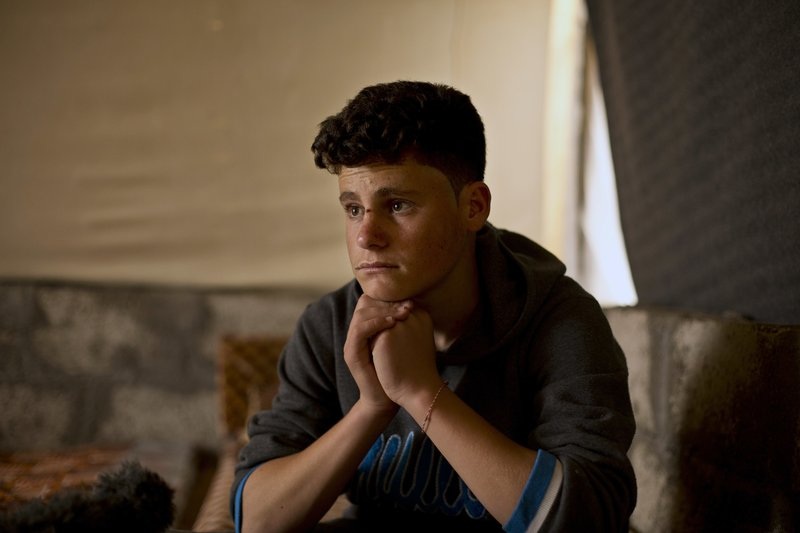
Ahmad Ameen Koro, 17, Kidnapped and trained by ISIS terrorists, April 13, 2017. (AP Photo/Maya Alleruzz)
Ahmed was 14 when the militants stormed into the Yazidi heartland around the northern town of Sinjar in the summer of 2014.
Tens of thousands of Yazidis were killed in the assault on Sinjar and neighboring towns and the militants kidnapped thousands of women and girls as sex slaves. The Yazidi minority, whose ancient faith combines aspects of Islam, Christianity, Zoroastrianism and Judaism, is considered heretical by the Islamic extremists. U.S.-backed Kurdish forces drove IS out of Sinjar in November 2015, but few Yazidis have returned, and an estimated 3,500 remain in IS captivity, scattered around its territory in Iraq and Syria, according to Human Rights Watch.
“THEY LOOKED LIKE MONSTERS”
It was the morning of Aug. 3, 2014, when the IS fighters descended on Ahmed’s village of Hardan. The family tried to flee, but their car couldn’t hold everyone. So Ahmed, his 13-year-old brother Amin, and four cousins set off on foot while his father drove the others to the nearby village of Khader Amin. The boys were to wait for Ahmed’s father to pick them up at a roadway intersection outside of Hardan.
But his father never came: The militants seized him and the rest of the family, and his father was never seen again. IS fighters then captured Ahmed and the other boys at the intersection.
The boys were taken to the IS-held town of Tal Afar, some 30 miles away, where they were kept in a boys’ school along with dozens of other boys and teens. The adult men were taken away, leaving the women and girls.
“They chose and took the girls they liked,” Ahmed recalled. “I remember the girls were crying, as well as the mothers. They were dragging these girls from the arms of their mothers.”
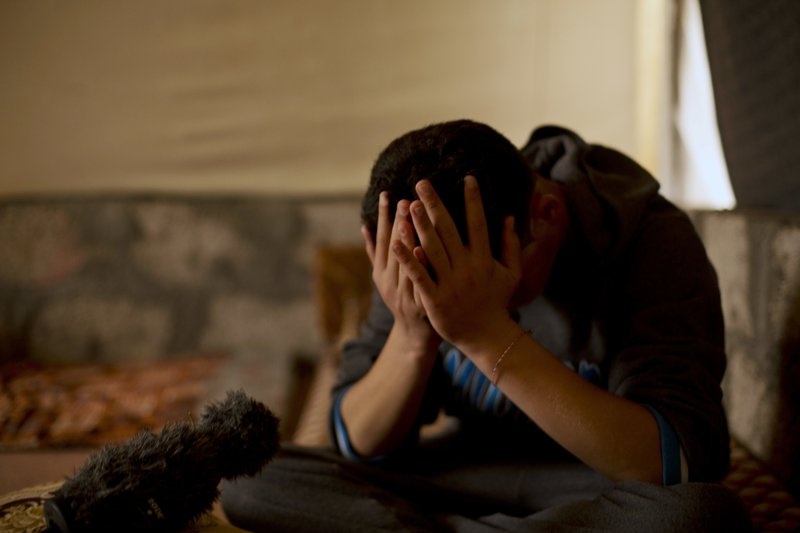
Ahmad Ameen Koro pauses during an interview in the Esyan Camp for internally displaced people in Dahuk, Iraq, on Thursday, April 13, 2017 (AP Photo/Maya Alleruzz)
“I was very scared. I’ve never seen such a thing. They were all very big bearded men, they looked like monsters,” he said. “My parents weren’t with me and I was thinking about them, wondering what happened to them.”
Ahmed and the other boys were then moved to Badoush Prison outside the IS stronghold of Mosul, Iraq’s second-largest city, where they were kept for 15 days. It was here that Ahmed noticed that every time the militants brought food, the boys would fall asleep immediately after they ate. There were, Ahmed believes, sleeping pills in the food.
The militants taught the boys Islamic prayers, instructed them in their hard-line interpretation of the Quran and forced them to say they had become Muslims.
“We were scared of saying that we were not Muslims because they would kill us,” he said.
Ahmed was among some 200 Yazidi boys sent to a two-month training camp in Tal Afar. Their days began with early morning prayer and military training exercises, followed by study of the Quran. They learned to shoot Kalashnikovs and pistols. On a large screen, they watched videos on how to use a suicide belt, throw a grenade, or behead a person.
“They were telling us if we were in a fight against the infidels ... we had to blow ourselves up and kill them all,” he said.
There was talk of sending the boys, who spoke a northern Kurdish dialect and knew little Arabic, to other Arabic-speaking countries to learn Arabic, study Islam and forget about their Yazidi parents.
“They were telling us, ‘You are not Yazidis anymore. You are one of us,’” Ahmed said.
“WHEN YOU GROW UP, YOU WILL BLOW YOURSELF UP”
Akram Rasho Khalaf was only 7 when his town of Khidir Sheikh Sipa was overrun by the militants on Aug. 23, 2014. His family tried to flee, but the militants opened fire and Akram suffered shrapnel and bullet wounds to his abdomen and hand.
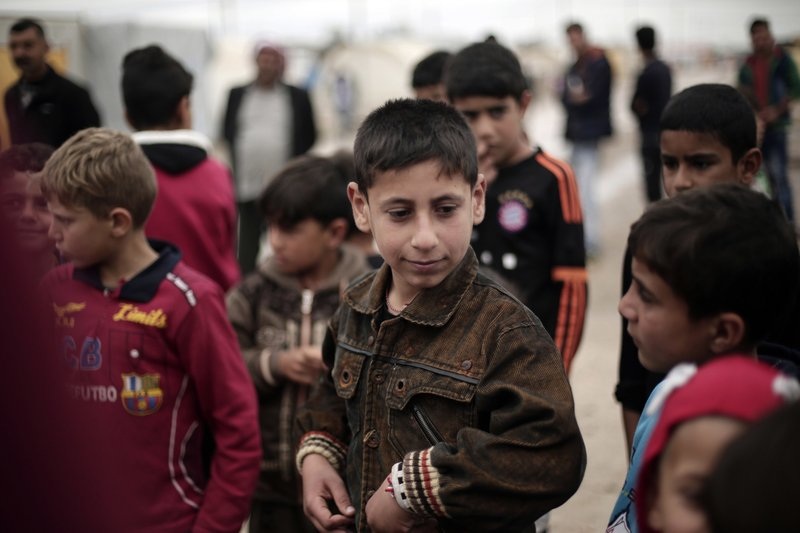
Akram Rasho Khalaf, 10 years old, had been kidnapped, trained and sold into servitude by ISIS terrorists. (AP Photo/Maya Alleruzzo)
“They started to shoot at us. My mother fell and I was hit. These are the bullet marks,” he said, raising his T-shirt to show two large scars on his stomach. Akram was taken by ambulance to Mosul, seized earlier that summer by IS, where he underwent surgery.
“They separated me from my mother, my sister, my brother and my father,” he said, adding that he never heard from his parents again, though his mother is believed trapped in the western sector of Mosul still held by IS.
Akram fidgeted as he talked about the overwhelming hunger he felt while in captivity. Asked if he was scared, the boy, now 10, said he was too hungry to be afraid.
Eventually, he was brought to Raqqa, the Islamic State group’s self-declared capital in Syria. There the militants would throw balls at the children’s heads, Akram said. If anyone cried, they were beaten. Those who didn’t cry were praised for being tough and told they would one day be suicide bombers.
“They were saying they are our friends, but the kids were scared to death,” Akram said, speaking to the AP in Kabarto Camp, near Dahuk, where he now lives with his uncle, two siblings and other relatives some 90 miles (150 kilometers) north of their home village.
“They were telling us, ‘When you grow up, you will blow yourself up, God willing,’ and some of the kids said, ‘We will not blow ourselves up,’” Akram said. “Then they asked us, ‘Which one of you wants to go to paradise?’ And the kids didn’t know what to say.”
“But they wanted all of us to blow ourselves up. They were saying, ‘You have to blow yourself up!’”
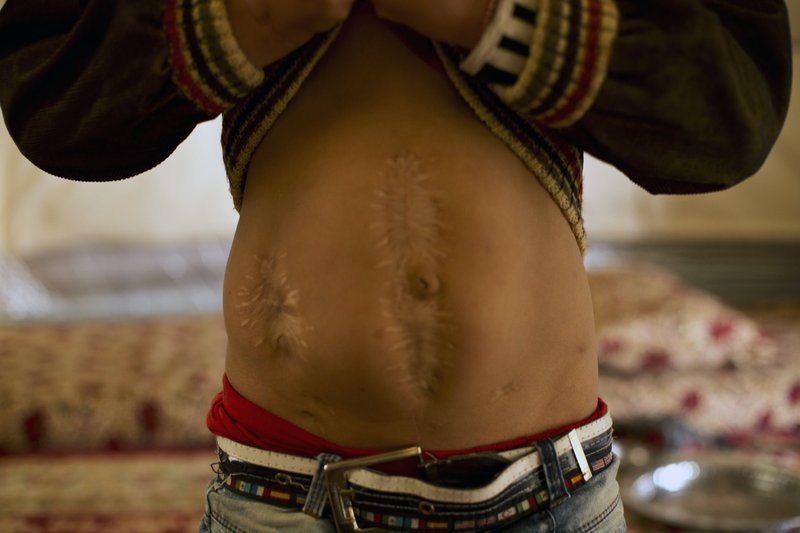
Akram Rasho Khalaf, 10, shows scars from wounds sustained when he had been captured by ISIS terrorists. Friday, April 14, 2017. (AP Photo/Maya Alleruzzo)
Training included sliding on their bellies through barricades of burning tires, jumping over obstacles and off roofs, the child said. Small for even his young age, Akram wasn’t strong enough to handle a gun, so he was forced to be a servant and was sold to various fighters.
ESCAPE
Two years after Akram was taken captive, the boy’s uncle, Hasar Haji Hasan, received a photo on his Facebook page of his nephew dressed in black Islamic garb, along with an offer to smuggle him out of Raqqa for $10,500 — an increasingly common practice as IS militants seek to earn cash by returning the youngest of their captives for a price. The family borrowed the money from a relative in Germany, where there is a large Yazidi refugee community. Eventually the boy was smuggled out and taken by motorcycle to a Kurdish peshmerga checkpoint. He was reunited with what remains of his family on Nov. 29 — two years and three months after he was seized by the militants.
For Ahmed, escape came sooner. On May 4, 2015, nine months after their capture, Ahmed, his brother Amin and a cousin managed to slip from the militants’ sight at the military training camp in Tal Afar. Their cousin was soon recaptured, but the brothers hid in a mosque until nightfall, then fled with a small group of other escapees on foot.
“We were following the movement of the sun and continued walking at night,” he said. “We were very thirsty because we ran out of water and we could not find the safe road. We ran out of everything. We were almost dying.”
But fear of IS kept them going, and after a nine-day 55-mile (90-kilometer) trek they reached the Sinjar mountains, where Kurdish peshmerga forces rescued them.
“HIDE THE KNIVES”
Akram’s uncle says his nephew has been deeply affected by his time in captivity, suffering nightmares, anxiety, sleeplessness and bedwetting. The boy’s brother, 8-year-old Raiid, and 5-year-old sister Jumana, rescued separately after ransom was paid, have similar problems.
“Sometimes they become very aggressive and they beat up other children or our children. They are not like other normal children. Their mental health is very bad,” he said.
Akram’s sleep is interrupted by the militants, who menace him in his dreams, the boy said.
“When I go to sleep I see Daesh in my dreams and they say, ’Come,’” he said. “And I get very scared and I wake up and I can’t go back to sleep.”
Carl Gaede, an American clinical social worker and executive director of Tutapona, a U.S.-based nonprofit specializing in war trauma, says these reactions are common among survivors of the horrors that people have experienced under IS rule.
“We’ve seen a number of the children acting out in violent ways and family members needing to hide the knives, hide dangerous items out of fear of how the children might use them because of what they’ve seen and participated in,” said Gaede, who along with his staff works with survivors of IS brutality in Esyan camp, where Ahmed lives with his family.
Ahmed sees a counselor, like many of the Yazidis living there. “He tries to restore my mind, to bring me back to how it was before Daesh,” the teen said of his counselor. “He tries to get this fear out of me. He tries his best.”
Ahmed fills his days now with school — English is his favorite subject — and running a small shop at the camp selling women’s and girls’ clothing and shoes.
Asked about his dreams for the future, Ahmed answers immediately. “When I grow up I will take my revenge against Daesh, against those infidels,” he said.
Akram, now a ball of energy on a tiny frame with an easy smile and a killer dimple, also has a ready response. Asked what he wants to do when he grows up, he declared: “Fight Daesh.”
Source: Associated Press
















